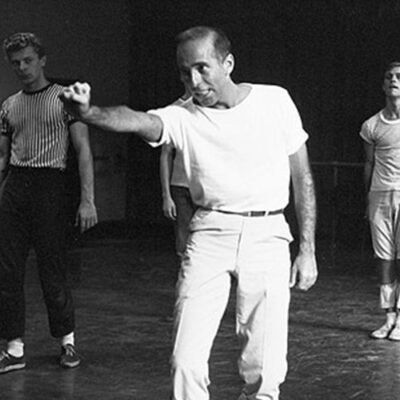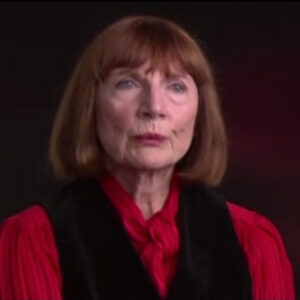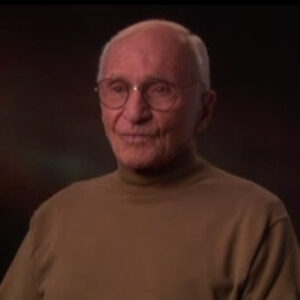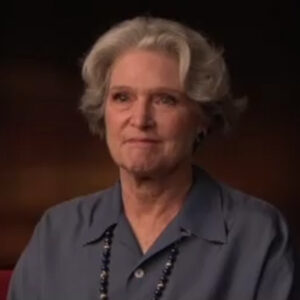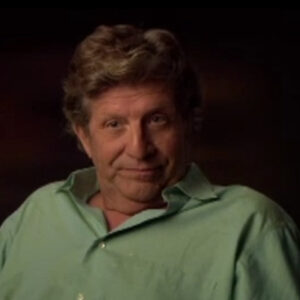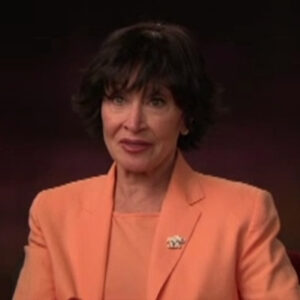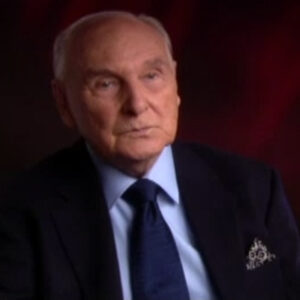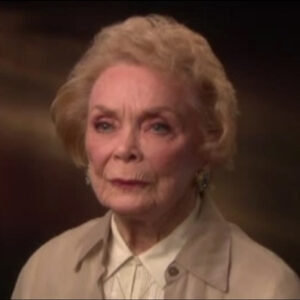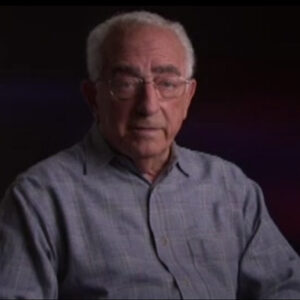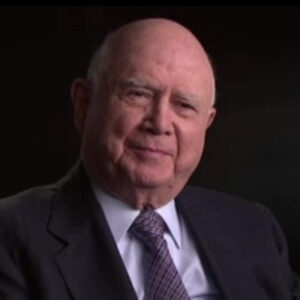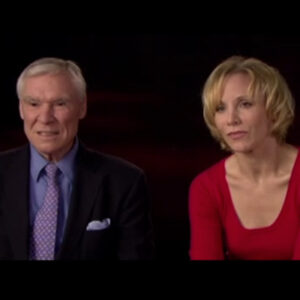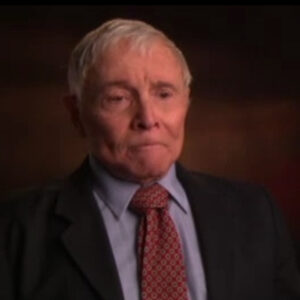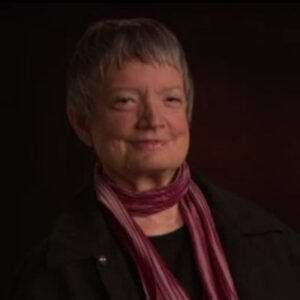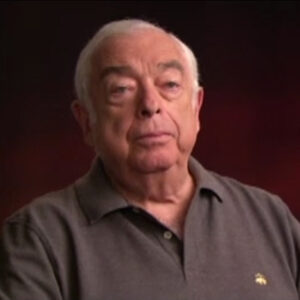Speaker So, John, OK, most people know you as a composer. Could you tell us what your role was in Gypsy and how it was that you came to work with Jerry Robbins?
Speaker Well, I came to work with Jerry because of an odd series of coincidences, really. I was out of town and up. Do you want to hear this whole story? Sure. Why not? OK, I was out of town in Philadelphia when West Side opened, and I was I had a job in New York that I had to, but that doesn’t matter. And I was there to meet with somebody. But anyhow, there was the party afterwards was in the variety club and there was a big bar and there was about five or six deep at the bar. And I was very unaggressive about getting my drink. And this little man standing in front of me saw my distress and said, What do you want to know when I order mine? And he did. And we got to talking briefly afterwards. And his name was Joe Lewis. And he was the pianist for West Side Story.
Speaker And we kept up a slight correspondence afterwards.
Speaker And he said he was going on his holiday and he needed us up. And he said, Would you like to come? And I said, sure. I said, sure, a lot those days. So for three weeks, I was subbing in the pit of West Side Story. And during that period, they were auditioning and putting in a lot of new people in the cast. And Ruth Mitchell, the choreographer, had me playing for those rehearsals.
Speaker And I’m going to stop you a second. Ruth Mitchell was not the choreographer.
Speaker No, no. Ruth Mitchell was the stage manager. So did I say she was a career? Oh, really? Anyway, Ruth Mitchell, who was the stage manager for West Side, had me playing rehearsals for the new people that she was putting in the company. And after a while, she kind of got used to me in that capacity. And so that when they started having auditions for Gypsy and they needed a pianist, she called me and said, would I sit in and play those auditions, which went on for weeks? And so there I was in the pit playing auditions with Jerry and Ruthie for what seems to me went on for like six weeks. Couldn’t it may not have been that long anyway. What happened was at the end of that time, I think Jerry just got used to me and we had a conversation which was literally, hey, do you want to do this show with me?
Speaker And I said, Do you want me to? And he said, Yeah. And I said, Yeah. And that was it. And so that was how I came to be to dance, arranging for for Gypsy and my.
Speaker Well, that’s the answer to actually the answer to the question.
Speaker So what my feeling, incidentally, is that if I had been able to get my own drink at the West at West Side Story opening, I would never have had a career of any sort.
Speaker What can you tell us about your interaction with Jerry during the show? I understand that you sometimes improvised with him. Is that true?
Speaker I mean, like really improvised. Yes. Jerry loved to improvise at the piano. He was a Betty Wolberg who was had been a pianist working with him for four years. And I both would stand in for this, what it was like playing a duet without any music. And he was good at this, too. You would start you’d sort of pick a key to start with and I’d be on the bottom or Betty would be on the bottom and he and you’d start playing and you started improvising yourself and Jerry would start improvising along with you. And it was really quite remarkable because he could intuit musically where you were going just just as you could as an improviser. I’ve always felt and I think I’ve said this before. I had a I had a very good time with Jerry, so as did Betty Wolberg, as did Julie Stein, as did most of the musical people that I know. And I think Jerry had a.
Speaker Somewhat special.
Speaker I don’t know what the right word is so much sort of special connection to musical people or a certain trust in musical people that he may not have had for the entire rest of the world. I can’t bear that out except from examples of just watching him with musical people. He was relaxed and not on guard with musical people.
Speaker What did you observe about his collaboration with Julie? I beg pardon? What did you observe about his collaboration?
Speaker I saw a remarkable thing happen. One day we were in rehearsal. For some he was seen or a number.
Speaker I just knew that I had to be there and Jerry was really getting wound up and he was feeling very testy and and not in a good mood. And suddenly Julie burst in and basically saying, I’ve got it, I’ve got it, you’ve got to hear this. And we all sort of recoiled because, my God, Jerry was really going to lambaste him. And Julie went over to the piano and sat down and started to play. And we looked at Jerry expecting an explosion. And what really happened was that Jerry stood back and smiled and folded his arms. And Julie played through this entire thing that he had written. And Jerry kind of laughed partly because he liked it and partly because he had intruded on this rehearsal. And he was very sweet to Julie. And so that’s one of those moments which makes me think that somehow other musical people occupied a different territory for him.
Speaker I don’t remember what the no, no, I don’t remember what it was.
Speaker I just remember watching the dynamics of that scene and thinking, oh, my God, I can’t think of anybody else who could have gotten away with that.
Speaker At some point. They came to a little bit of a disagreement over a little lamb, as I understand. Right.
Speaker I don’t know. I don’t know much about that. I know I wasn’t really part of the inner circle in that show, but I know that Little Lamb was in a little lamb was out and Little Lamb was in a little lamb was out. I was I was not present at the conversations about it.
Speaker OK, and you weren’t there for their infamous confrontation? No. Merman wasn’t known as the world’s greatest actress, but Jerry seemed to get a performance out of her. How what did you observe about their interaction?
Speaker One of the things that happened in rehearsals that Jerry would work out a scene, but not on Merman. I’m trying to think of the actress’s name and she was quite wonderful. She she had a career of her own and she died quite young.
Speaker But she was I guess she was Merman’s understudy, but she was also there so that Jerry would do all of his blocking work on her. On her.
Speaker I my memory of it is that then he would bring Mirman and and and start to work with her and give her that structure.
Speaker I don’t remember seeing confrontation with Merman, who was very cool and very strong, but.
Speaker And sort of seemingly. Seemingly unemotional about what she was doing.
Speaker One day we were in Philadelphia and it was the end of a matinee, Jerry and I had gone out to get something to eat.
Speaker We came back and at the just before everything’s coming up roses, and Mirman was belting it out and she had tears streaming down her face. And I remember Jerry and I looked at each other because this was not a common occurrence, but it was a big time emotion going on. On that stage. The curtain came down and she saw the two of us in the wings and she immediately said, You see, I’m acting, I’m acting. And she brought the curtain down on herself. But somehow or other from time to time, he could tap into something with her.
Speaker I can’t tell you how they worked together when they were alone or how he got what he got from her. But up until the opening or up until it was frozen, she was really I found her quite moving.
Speaker After the show opened, she became the legendary Merman who.
Speaker What what’s the famous story about Miss Birdseye? Anyway, the show is frozen and this is what I do, but in rehearsal as opposed to in performance later, she was more surprising, more emotional, at least in my observation.
Speaker What do you attribute that?
Speaker I, I don’t know.
Speaker I think I don’t know what they said to each other. I do know that there was clearly more to her emotional makeup than most people got to see. And that moment at the end of Everything’s Coming Up Roses was the proof of it.
Speaker And the cover up as well.
Speaker And what do you think Jerry had to do with that?
Speaker I can’t tell you what Jerry had to do with it, except that he worked very hard with her. I don’t know what her feeling was about him or what his about her was personally, but I think they both had I think they were both kind of in awe of each other.
Speaker The.
Speaker And even though she could be very brusque and seeming not to be vulnerable about certain things, I think she probably was.
Speaker Much more reachable than most people thought.
Speaker She said, I read somewhere that she said she felt she never been shown to greater advantage than by and Gypsy, so clearly she was grateful.
Speaker What distinguished Jerry from other directors of musicals with whom you’ve worked?
Speaker That’s interesting because up until. Up until Gypsie, I had never worked with the great director, so he was the first one. Gerri had terrific instincts, just terrific instincts. Theatrically, and he didn’t always know how to express those things, and I remember Jack Klugman said to me when he admired Jerry very much, Jack had had the lead opposite Mirman and he said sometimes in rehearsal, I just like to be sitting next to Jerry. And every time he had an idea, I’d say I would say to Jack, Go on, go on, do it.
Speaker The.
Speaker Language was not Jerry’s best, best friend, and I suspect that. A lot of the bad moments that he had with a lot of people, with a lot of performers particularly came about because of his own frustration at not being able to say what it was that he felt in a way that was useful for a for an actor or a dancer. Again, that’s a guess on my part. I think going back to the idea of his trusting musicians a little more, it was because music is not a verbal activity. You don’t say that. Somebody give me a B flat over here and then what good music is in great part, at least the kind of improvising that we used to do. It’s just an instinctive thing. And the way Jerry worked as a director anyway and and probably as a choreographer was the way a musician does to where a lot of it is just coming out of you. And you can play it. You can’t describe it, but you can play it. I don’t know if that makes any sense.
Speaker It makes perfect sense. What was he like in rehearsal? What was he like in rehearsal?
Speaker I can’t really answer that, I don’t know a blanket. I don’t know a blanket answer to what he was like in rehearsal when he was on sure ground. He was fine when he was on less sure ground or unable to express himself. He was a terror famously so.
Speaker He was.
Speaker If he had people whom he had confidence and to whom he felt he could communicate and where he was kind of sure what it was that he wanted. I think he was I think he was fine when he couldn’t or when he couldn’t get what he wanted, even though it was his fault for not being able to get what he wanted, he could be pretty miserable.
Speaker Can you give me an example of that?
Speaker An example of the of the pretty miserable part.
Speaker There was a.
Speaker Well, there were two, I guess, and all I need is the girl he was really tough on Paul Wallace, who whose song it was and he wanted I’ve always thought that.
Speaker And I think I think Steve Sondheim felt this, too.
Speaker It seems to me I remember him saying this. Jerry really wanted to be that character. That was a character that he identified with. And so nothing that Paul could do could would satisfy Jerry. And he was really, really tough on him and not in a helpful way. Jerry really wanted to be up there being that guy, and nobody was ever going to make him happy doing it.
Speaker I remember also.
Speaker Now, I don’t know the full facts of this, but I was there was a girl playing dainty June. Are playing June really a and she was going to be replaced and he worked with her one one last time in a theater, just worked with her to try and get a certain performance from her. And by the time he got finished with her, I don’t know how she could move. He had paralyzed or so. And I remember wishing that I were someplace else. I don’t know the whole story behind that, I just know that what Jerry was doing was not helping her, just as what he did with Paul was not helping him.
Speaker Um.
Speaker Were you familiar, as long as we’re talking about the Jews, were you familiar with what happened when the replacement came and what happened that the person you’re talking about actually was fired eventually?
Speaker That was Carol D’Andrea. Right, OK. I think that was Carol. Yes.
Speaker And then later Bradbury was hired. Right. Right. Do you remember what happened with Leon?
Speaker You mean later on?
Speaker Well, she was Jerry gave her direction about it must have been the the Mr. Goldstone saying, Jerry give her direction about moving a teapot. Do you know about this?
Speaker Is this where you didn’t where she didn’t give a prop to Timerman her? I never knew the full details of that. I know that.
Speaker I’ll tell you later that perhaps you were there.
Speaker I may have been there. I was fortunately not there the night that he removed the thing from the train.
Speaker How did the company feel about him?
Speaker A mixture, I think they were scared of him and they were awestruck by him and of.
Speaker It’s hard to explain about how people felt about Jerry because Jerry, when he was not working.
Speaker Was a really sweet, amiable guy and that you could really talk to.
Speaker Now I know a lot of people maybe had personal experiences with him off work that were unpleasant. I did not. He was he was always very nice to me.
Speaker He was very nice to Betty Walbert again.
Speaker Again, it’s my theory about music. He was not defensive.
Speaker And. But in a working situation. For whatever reasons, whatever devils were working in him, he could be murder.
Speaker He could also be very warm and very excited, and if somebody got it or if somebody had that particular kind of personality that he responded to, he was also very easy and very warm. I think if you asked Jack Jack Klugman about his relationship with Jerry, I think Jerry respected him a lot. And Jack in no way threatened him.
Speaker You’ve told or at least you quoted by one of the Robin’s biographers saying that you felt, I’m going to read the quote, he was sort of crippled in one department. What did you mean by that exactly?
Speaker Was that in response to something?
Speaker I think that you were probably talking about his interpersonal relationships at work.
Speaker I could have been I think it’s basically what I’ve just been talking about.
Speaker He also. And this is this was mysterious to me with Jerry.
Speaker We had a member coming back from Philadelphia on a train to New York, for some reason we were sitting opposite each other and and we talked and I got to know him a bit more than and I knew that his two great gods were George Abbott and George Balanchine.
Speaker And one of the great.
Speaker Something that applied to both of them was the fact that they were very prolific and not self-conscious about what they were doing, Balanchine would produce, it seemed like five new ballets for season. Four of them would be mediocre and one of them would be the Firebird and was the same with George Abbott. He he just directed he liked directing. And he did a lot of mediocre stuff. And then something wonderful would happen.
Speaker And it always struck me as ironic that Jerry admired those two men so much and could not let himself be either of them. They both both Georgias really had fun doing what they were doing, which is why they were so prolific, at least I believe. For whatever reasons, and maybe that’s what I was referring to for for some reason, Jerry could not let himself do that. And even though he produced a lot of work, he didn’t produce nearly as much work as he might have had he been perhaps. Let’s I don’t know, self-conscious is the right word, whether he was looking over his own shoulder feeling that everything he did had to be a masterpiece, I don’t know. All I know is that for any artist. That would be crippling.
Speaker That you call them Mr. and Mr. Beck, that was so cute. Um, yeah, he was he was, um, agonized, I think is maybe the word.
Speaker But what what what the agony was about. I have no idea. I never got to know him that well.
Speaker Um, Gypsie is often cited as one of the greatest, sometimes the greatest musicals of all time.
Speaker Um, hang on one second is I’m hearing a lot of noise from over there for me. Yeah. Sorry. That’s OK. I presume it’s not being recorded. OK, um. It’s just distracting. Sorry. That’s OK. Um, Gypsys often cited as one of the greatest musicals of all time. Why do you think that is.
Speaker Sometimes I’m a piece of theater or a ballet or a piece of musical theater. Works. This sounds so simple minded, but it just works. It means all the elements are there in just the right balance. And when that happens. Something great happens, you can’t. Predicted.
Speaker And you can’t insure it, what you can do if the people if the creators are really talented and smart.
Speaker Is to have so much conversation before things get started that you’re all doing the same piece.
Speaker I’ve seen it work the other way where a choreographer is doing one show, a director’s doing another, and the playwright certainly had something else in mind. I don’t think that was true in Gypsy. And I think that’s one of the things that makes it work.
Speaker I think the talents of everybody, the people. The creators of Gypsy were all at their peak at that time. And.
Speaker It was just one of those fortunate moments where they were at their peak and equal.
Speaker I don’t know if that makes any sense, because in the annals of the great choreographer directors on Broadway, where would you place Jerry?
Speaker That’s a that’s an unanswerable question, and I think just like we’re talking bests, I can’t deal in best, I can only deal in the work that people do.
Speaker If you saw bad Balanchine ballet, you would say, what’s this? What’s this all about?
Speaker So it has to do more.
Speaker Taking into account his whole body of work, what Jerry might have been as a director of musicals. Had he been able to be more of the Jorges is something we don’t know, but there’s a sadness in the fact that.
Speaker We all looked to Jerry, I think, to go on producing wonderful pieces of musical theater and he just stopped and why he stopped, I do not know.
Speaker I don’t know how much of Jerry was fear. I think a tremendous amount, probably. I had one. Kind of funny experience, which eliminated him to me for a moment, anyway, we were working at the New Amsterdam roof, the roof of the New Amsterdam theater, and it was just at that point, it was just scaring me because I was improvising something that he wanted to use an extension to a dance. And it it got to be late. And he was. Things weren’t going so well and he was tired, so he said, let’s stop. I said, let’s sneak into the movies and downstairs and the newsroom was in a movie theater. There was a horror film called The House on Haunted Hill. I always remember this with Vincent Price. So we sneaked into the movies, which was already, I thought, pretty dark. And we were sitting in the back and then I was sitting next to Jerry and all of a sudden I saw. So I was like this and I thought, oh, shit, he’s going to be in a really bad mood and he’s got a headache. This could be really unpleasant. Then I watched him. And his fingers spread and I realized that it wasn’t a headache, it was that he was scared to death and I think that was the moment where he became most human for me.
Speaker I think he was scared a lot. Actually, that’s a great story. Did he ever talk to you about Jerry and how he felt about him?
Speaker He talked about Jerry on the Internet, just mentioned Bob Hope, Bob Fosse. He spoke about Jerry, but not in a personal way, just in terms of his admiration for him. I think Bobby always felt inferior to Bobby, felt inferior to a lot of people. But to to Jerry and to Balanchine, certainly.
Speaker You said that you again, I read this in one of the biographies that you learned from Jerry. What did you learn from him?
Speaker I think I think I learned one of the things I learned from from working with Jerry is to trust your instincts.
Speaker This both, both from watching him trust his instincts and watching him squash them.
Speaker And I think it was fascinating to watch him when he was free.
Speaker And just letting himself go and do it.
Speaker And that helped me.
Speaker When you talked about Jerry, his feelings about Albert Balanchine, he also revered Astaire. Did he ever talk to you about Astaire? I’m thinking he might have in relation to all of you know, as the girl.
Speaker He did, Jerry, didn’t. He may have talked to me. Jerry may have talked to me about Astaire. I, I like. How could you. Not in that.
Speaker No, but not to a great not to a great extent.
Speaker But he certainly felt I mean, it speaks to every minute he was on that stage trying to show Paul Wallace what it should be really like.
Speaker He was very austere, like when he worked with you, as in your dance arranger capacity. How exacting was he? Was he a person who knew what he wanted or not?
Speaker No choreographer, practically no choreographer that I’ve ever worked with knows exactly what they want. They may come in knowing what they want to achieve or what their goal is, but they don’t know exactly what they want.
Speaker The the.
Speaker Let me see if I see this right. A good dance arranger where the choreographer is somebody who can improvise and try to get in the choreographers mind and just go with him.
Speaker If you went if you were with Jerry in a rehearsal, just the two of you, if you could just go with him, then your fingers, your fingers do it as well.
Speaker And that was true later on without a white with with every choreographer I’ve ever worked with. And it’s something that fortunately I have fun doing. And so the best times between a choreographer and a and arranger, pianist, composer, whatever, it’s when the two of you start doing the same thing at the same time.
Speaker It was when I described Jerry Jerry’s ability to improvise at a piano while I was improvising below.
Speaker That’s what it’s like when you’re working with a choreographer. It’s like he’s playing the upper part of the piano and you’re playing the bottom part of the piano. But neither of you is talking about it. I don’t mean that it’s not quite as free and easy as that, but the most fun is when that’s happening.
Speaker And so you were playing and he was dancing, right?
Speaker A lot of times said, yes, that would be. Sometimes there would be. After you got a shape, was that the big nemesis for Jerry in that show, as far as I know, was the cow dance? Don’t don’t ask me why it was, but it was. He hated it. And we must have done the cow dance 100 times. He was not he was not mean to me about it. He just couldn’t get anything that he liked.
Speaker And so that wasn’t fun.
Speaker Of.
Speaker Other moments, I mean, all I need is the girl who was fun, he had he would he had so clearly in mind what it was that he wanted, that he could have fun doing it.
Speaker I think he really never wanted it to end. I think he really never wanted to finish doing that. No, because that meant that he would have to stop dancing it.
Speaker Were you there when he and Arthur. He was working on it with Arthur. I beg pardon. Were you at the piano when he was working on it with Arthur?
Speaker I do not remember.
Speaker It was either me or Betty who apparently he he had put Arthur in the role of the girl and worked out the number that may have that may have happened.
Speaker I don’t remember it. It’s hard. It’s an image. I would like to have a photograph of you and me, but.
Speaker I have to say one thing about that production, the tensions that were going on among the creators was something I only knew hints of.
Speaker I knew there was a lot of bad stuff happening, but I didn’t know what it was and I sure didn’t want to. But when the great moments happened, that was that was really terrific. When they finally did the final version of Mama’s Turn and Steve sang it.
Speaker My memory is that he was really he and Julie were showing it to Jerry and to Arthur, and that was one of the most thrilling moments I ever had in my life. Watching that happen and watching Steve.
Speaker Really get to the core of something, it’s such a simple, direct way.
Speaker It was wonderful.
Speaker You got to have a gimmick was one of those pieces that came together partly because of. Of the three women involved, I was there the day that Faith Dane came in to audition and bent over and played taps and. I can’t recall a specific day when everything was put together with those of those three women.
Speaker I was sure I was there, sure I was playing, but.
Speaker He what’s what what’s the Communist Manifesto two from each according to his ability to each according to his need. He really took everything from faith, I think she did. She sue them later.
Speaker A company. But I remember. She Kornilov was late arriving at that hour, so she had to be out of town for a few days and she walked and went face down, was bent over and playing taps. And I remember remember her turning to me. I think it may have been the first time I ever met that kind of saying, who’s that broad playing taps through her? Zook and I don’t know how she ever felt about faith after that, but I think she probably knew that that was going to be a hard moment for her to top. I don’t think that I don’t think putting that number together was a bad period, I think everybody was really we were all too busy laughing.
Speaker How about strip, I know you worked on the strip a lot, the strip.
Speaker I had a funny experience with the Strip because I got sick just before the opening.
Speaker When we did a run through in New York before we went out of town.
Speaker But what’s your name? Who played play Gypsy? You know, I remember that. Getting her to let go and to let her.
Speaker Expose her body and sensuality with something which was a problem, I think, for all of the creators, for Jerry, too, and.
Speaker I remember there were two pianos and there it seems to me in my memory, there were two pianos and three pianos and we kept trading off because Jerry, what he did at the end with the strip was to not set it. At this point. He just had Sander walk back and forth and we kept playing, improvising strip music.
Speaker And it was a remarkable moment. We could the the pit was such that you could actually look up on the stage and see what was going. Sandra Church suddenly became really sensual. It was like watching somebody discover her own body. And it didn’t end, the strip didn’t end at that point, we had there was no ending to it.
Speaker It just went and went and went and went until they decided to stop out of town.
Speaker I think they were never able to find a way. To show that and to let that happen and to find a forum for it, and when I got sick just before they came back to New York, they still had not. And when I finally and when I saw it, I thought they had. Just they had sort of given up on the idea that that was going to happen, that that great central moment was going to happen and I had just constructed something so that so they could end it and watch her progress in terms of becoming a great success. But nothing I ever saw will equal that. And that moment was I think it was in the it could have been in the Martin Beck that we were doing this. But no no one was in the Winter Garden Theatre, I think. Well, anyway, it doesn’t matter. It’s whatever theatre we were in. Sandra did exactly what happens to Gypsy in the script. She discovered herself just as Gypsy discovers herself. It’s never been that good again in my mind.
Speaker And that’s just because Jerry had her.
Speaker It was unstructured. He had her. I can’t tell you exactly what he said to I probably would have known more at that time, but I remember it went on and on and on until little by little you could watch the actress begin to like this. And that’s one of my favorite moments of working in the theater ever, because it was so spontaneous and revealing and honest.
Speaker I don’t know whether the creators of the show would agree with me about this, and they might say that it never they never were able to quite capture that again.
Speaker Is there anyone else on the ground all over the world been that good? Yeah, in my mind. Did you hear that? Oh, Roger says that if you could just say and it was in my mind, never that good again. There was an extraneous noise at that point. Oh.
Speaker Just say that line in my mind, it was never quite that good again.
Speaker Thank you. Is there anything else that you would like to say about Jerry or Gypsie that I haven’t asked you?
Speaker Jerry and I weren’t that close, we we. We kept in touch for a few years. And it was always very cordial, but we lost contact with each other, not for but not for any reason.
Speaker But I know I know how complicated Jerry was without having any idea what the complications were about.
Speaker I’ve read a lot of stuff and I’ve heard a lot of stuff and I’ve talked to a lot of the players.
Speaker The mystery of what his demons were about was something that I simply didn’t know.

